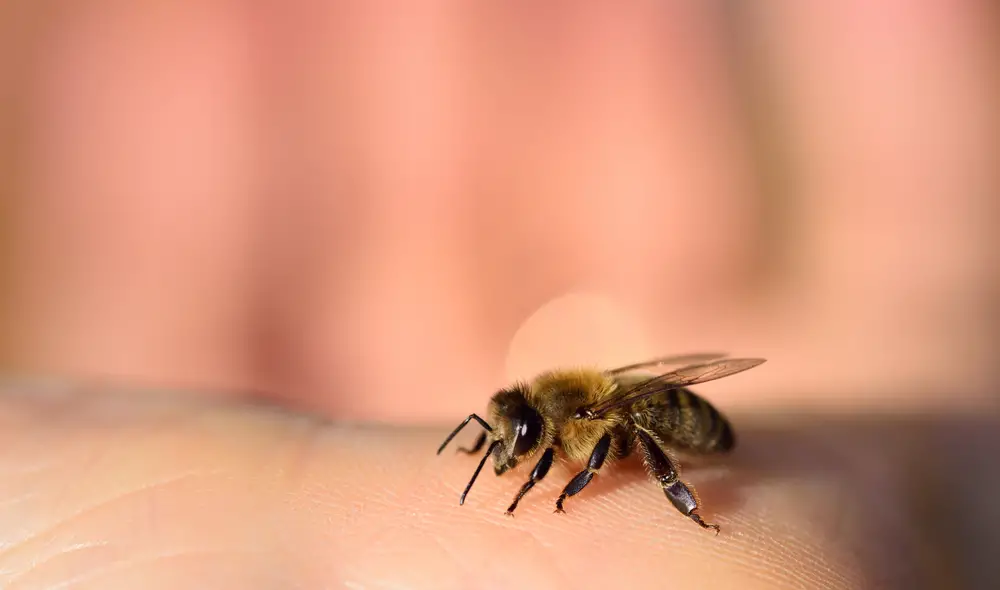It’s great to spend time outdoors when summer rolls around, and you’ll get a bit sweaty doing so. You may have heard a rumor that bees like sweat, but is there any truth in this?
Only sweat bees like sweat for its salt and nutritional content. Some species of honeybees also like sweat, but most other species do not.
A Brief Introduction To The Sweat Bee
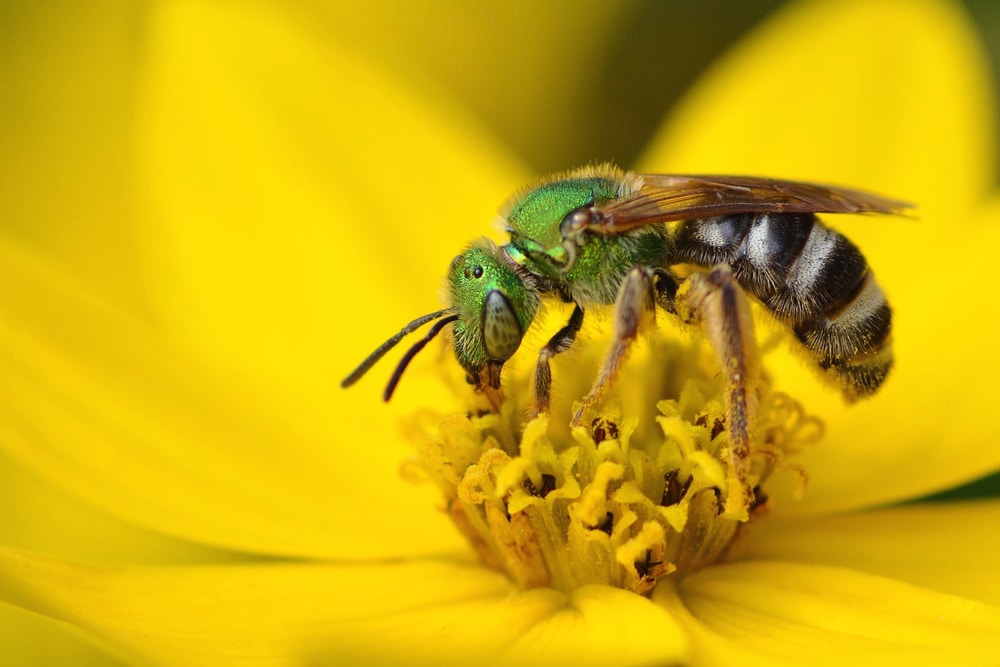
The sweat bee is a common term for a family of bees known scientifically as Halictidae. This is the second-largest family of bees and contains a whopping 4,500 species! However, these species have great diversity, so sweat bees can come in all shapes, sizes, and appearances.
Out of the seven bee families, most are diurnal (active during the day), but sweat bees are one of the families containing some crepuscular species. Crepuscular describes a creature most active at dusk and dawn. As a result, these sweat bees have adapted larger ocelli (simple eyes) that let in more light.
Bees within this family are found all over the world and in a variety of habitats. They’re common in deserts, forests, mountains, and open grassland. The only place on the planet you can’t find them is Antarctica.
Sweat bees are a solitary species. Unlike honey bees, for example, which nest in massive colonies, sweat bees will create a ground nest and remain there alone to raise their young. That said, there are examples of sweat bees laying their eggs directly on a flower so the larvae have instant access to pollen when they hatch.
Where Does The Name Sweat Bee Come From?
As I’ve mentioned, the term sweat bee refers to a group of more than 4,500 species of bees within the same family. But one thing they all have in common is their attraction to human sweat.
I’ll go into more detail on the reason for this later, but for now, just understand it’s the salt and other nutrients within the sweat these bees can’t get enough of.
Do Sweat Bees Really Eat Human Sweat?
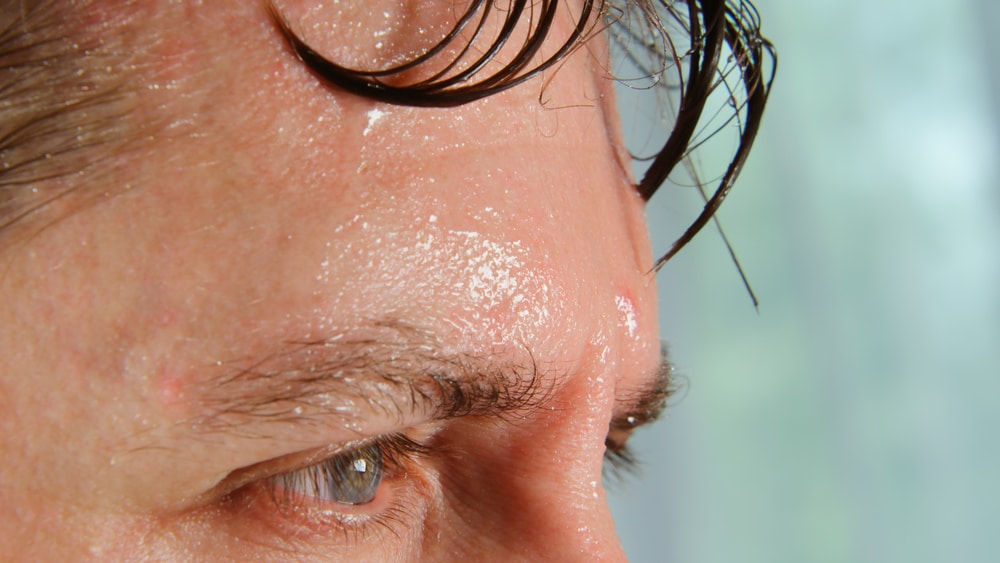
When you think about a bee’s diet, you imagine key elements like nectar and pollen. This is, of course, the main part of the sweat bee’s diet, but just like any other animal, they need to ensure they receive all essential nutrients.
One such nutrient is salt, and there’s a lot of this in human sweat. It’s this sodium that sweat bees are on the lookout for, but they also use human sweat as a moisture supplement. While it might sound gross, it’s just another day at the dinner table for the sweat bee!
Why Do Sweat Bees Like Our Sweat?
Not only does human sweat provide sweat bees with a salt and moisture source, but it’s also packed with important proteins.
While these nutrients are important for adult sweat bees, scientists have theorized they may also use them for their young.
Are Sweat Bees Dangerous: Do They Bite Or Sting?
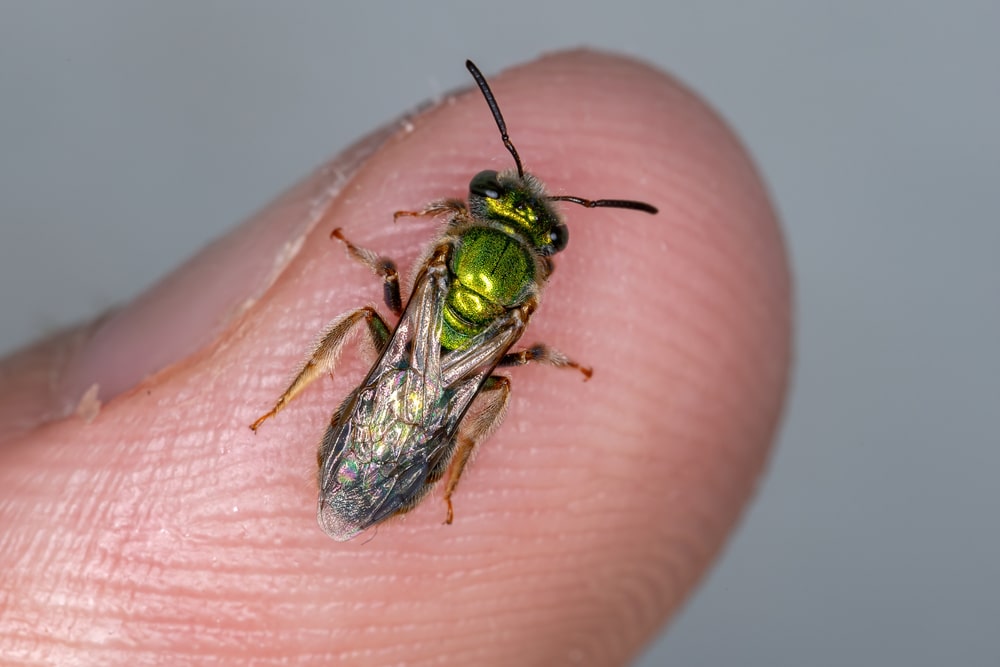
Like many other species of bees, sweat bees are not typically aggressive. They just want to go about their business without being bothered. They pose minimal risk to humans if you allow them to do this.
But most sweat bees possess a stinger, so there is a possibility they could sting you if you agitate them. That said, as is the case with most bee species, only the females can sting.
That’s why remaining calm is vital if a sweat bee lands on you. By swatting the bee, you’ll only anger it and risk them stinging you. It’s better to gently brush the bee away.
How To Deter Sweat Bees From Landing On You
In areas with lots of sweat bees, especially when the weather is hot and you’re prone to sweating more, there are things you can do to deter them.
Here’s what they are:
- Wear Clothing That Covers As Much Skin As Possible: Light fabrics like breathable cotton are best, as these will cover you but also keep you cool in hot weather
- Use Natural Insect Repellents: Peppermint oil is a good one
- Make Your Garden Unattractive To Sweat Bees: Fill in nesting holes and remove dead wood. While I’d usually advise planting native plants to attract pollinators, avoid this if you want to keep sweat bees at bay.
- Shower Immediately: If you’ve worked out, been for a run, or done any other activity that has made you particularly sweaty, take the time to head indoors and shower.
With all of that in mind, it’s important to remember anyone with a bee sting allergy will experience an adverse reaction to the venom. In this case, seeking medical attention is vital as severe allergic reactions can be fatal.
Where Are Sweat Bees Found?
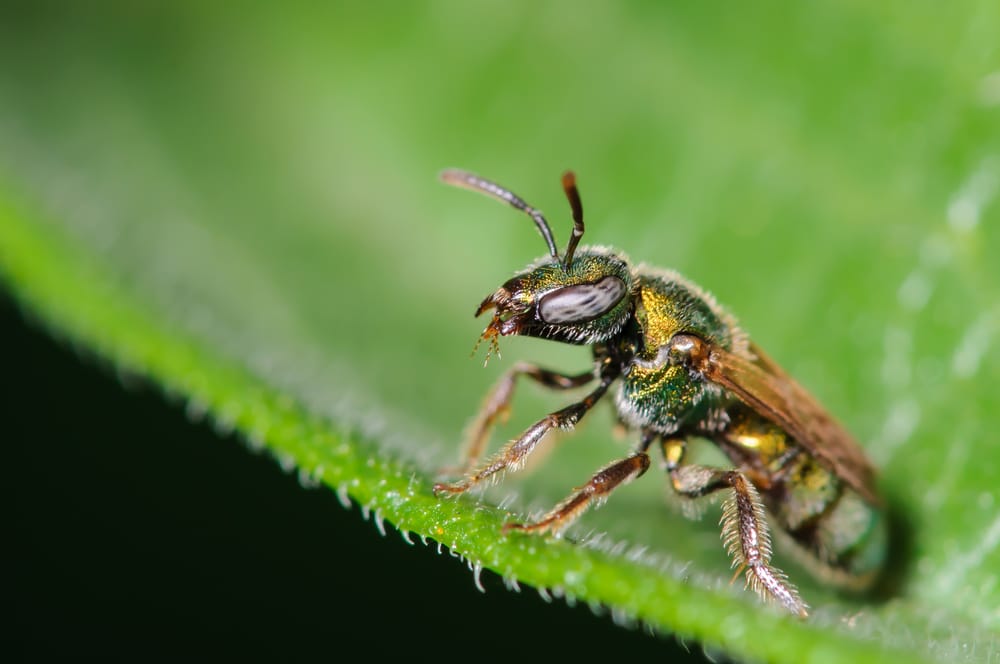
You can find sweat bees everywhere except Antarctica.
Sweat bees like various habitats as long as there is ample space for them to nest in the ground. While they’re found in deserts, grasslands, forests, and many other habitats, they’ll always choose somewhere with abundant flowers.
Halictus rubicundus is a type of sweat bee common in the northern hemisphere. These bees prefer a temperate climate; you can find them at low and high elevations. However, those at higher elevations tend to be more solitary.
There’s also the Halictus ligatus, found in the southern parts of North America, the Caribbean, and parts of Central America, including Mexico.
There are also many sweat bees in the southern hemisphere, including the Australian species, Lasioglossum hemichalceum. This species builds its nest above ground and prefers areas with wet winters and mild summers, such as Victoria and New South Wales.
How Can I Get Rid Of Sweat Bees?
Sweat bees might not pose a significant risk to most humans, but they can be irritating when you’re trying to enjoy your garden. In addition to some of the tips I mentioned above, there are other things you can do to make sure as few sweat bees visit your backyard as possible.
Use Safe Bee Repellents
Natural bee repellents are one of my favorite methods, as they won’t harm the bees. Things like citronella candles are very effective as sweat bees (and other species) don’t like the smell. Several non-harmful bee-repellent sprays on the market deter them but don’t kill them.
I would never advise using pesticides, bee traps, or chemicals. While sweat bees might annoy you, they’re still important pollinators. Harming their populations can have a wider effect on the local ecosystem and human economy. That’s because bees pollinate some of our most important crops.
Purposefully Make A Bee Area In Your Garden
You can also make a bee area (even a bee hotel!) in a far corner of your garden to contain the bees. I’ll always advocate for creating pollinator habitats. If you allow a small portion of the lawn to grow at the bottom of the garden and fill it with wildflowers, the bees will head there.
You could even place non-bee-friendly potted plants around your seating areas to really segregate them. Mint is one of the very best options.
Take Care Of Outdoor Airflow
Since sweat bees love humidity, ensuring good airflow around your outdoor seating areas is essential. Place fans strategically so the air keeps moving, and you’ll likely notice a significant reduction in the number of flying visitors.
Do Other Bees Like Sweat?
It’s mainly only bees from the Halictidae family that like sweat.
However, some members of the Apidae family (which contains honey bees) like sweat too. Amazingly, they’re known to collect this from humans.
In fact, these stingless bees will also collect animal and human tears and other bodily fluids. While this won’t cause any harm to you, it can be annoying.
With all that said, the most well-known member of the ApidaeI family, the European honey bee, does not like sweat at all. In fact, they actually get riled up at the smell of it, which is why beekeepers are advised to always wear clean clothes and shower before tending to their hives.
Final Thoughts
Most bees will leave humans alone, as they’re more interested in finding pollen and nectar. However, there’s one family of bees (Halictidae), sweat bees, who like sweat for its salt and moisture content.
Just keep in mind sweat bees are harmless to humans (unless you have an allergy). Take proper steps to deter them, and they won’t bother you.

